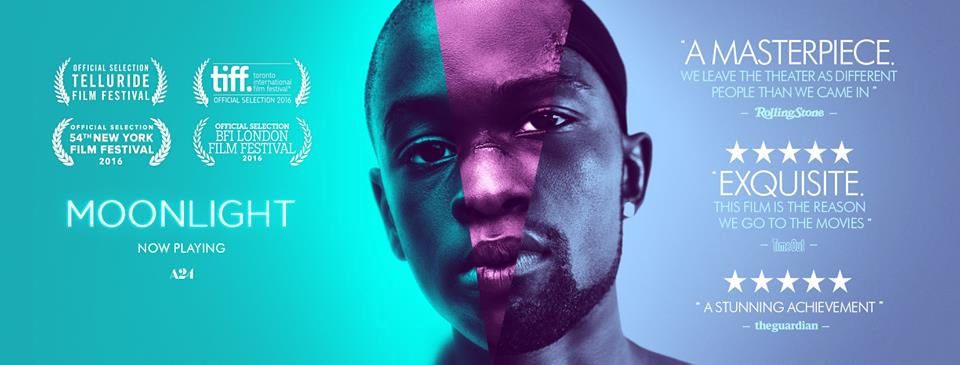Moonlight
- UK Film Review

- Nov 4, 2016
- 4 min read
★★★★★
Written and Directed by Barry Jenkins Starring Trevante Rhodes, André Holland, Janelle Monáe, Ashton Sanders, Jharrel Jerome, Naomie Harris, Mahershala Ali Film Review by Hannah Sayer

Adapted from Tarell Alvin McCraney’s play In Moonlight Black Boys Look Blue, Moonlight follows three periods of an African-American man’s life as he comes of age in Miami. Moonlight premiered in the UK at the BFI London Film Festival in its Official Competition section where it was met with a well deserved standing ovation. The film is a first for its production company A24, as for the first time they are fully financing and handling worldwide distribution of a production. A24’s previous films include indie breakout hits such as Spring Breakers, The Witch and Swiss Army Man, as well as Academy Award winners Room and Ex Machina. From observing A24’s exceptional, bold and innovative track record over the past few years, Moonlight is the perfect film for A24 to launch with as it is an urgent and rare masterpiece that is long overdue.
Moonlight, Barry Jenkins’ first film in eight years, is divided into three acts titled “Little”, “Chiron” and “Black” and each section follows Chiron through a different phase in his life: childhood, adolescence and into adulthood. What makes Moonlight so special is that it’s difficult to define to one genre. The film begins with Alex Hibbert playing Chiron as a young boy who is growing up in a rough neighbourhood with his mother Paula, played by Naomie Harris, who is dealing with her own drug abuse as he is also struggling to fit in at school. When a local drug dealer Juan, played by Mahershala Ali, comes to his aid, he and his partner Teresa, played by Janelle Monáe in her first film role, become his surrogate parents of sorts. A defining moment in the film’s first act is when Juan explains to Chiron: “At some point you've got to decide for yourself who you gonna be. And let nobody make that decision.” Chiron has been alienated from his mother and from his self and it is in these scenes that he shares with Juan and Teresa where he begins to realise himself for who he is. Chiron’s struggles with his own identity continue into the second act, where Chiron is now played as a teenager by Ashton Sanders. His mother’s drug abuse has worsened and Chiron’s future seems bleak. However, the film’s defining moment of sexual awakening on the beach forms the tender and extremely personal journey that the remainder of the film follows. Moonlight highlights and encourages discussion of masculinity, sexuality and race and in the process is successful in destabilising stereotypes. This extremely personal study of a young gay black man’s desire and his realisation of his homosexuality is something rarely seen on screen. When the film reaches its third and final act, Trevante Rhodes plays Chiron as a young man who reunites with Kevin, played by André Holland, who he experienced that tender moment on the beach with years earlier.
The film is elevated and wonderfully acted by Jenkins’ phenomenal cast. Naomie Harris is remarkable as Paula and she is likely to garner awards attention in the upcoming months for her fierce vulnerability in the role. Even though Mahershala Ali’s Juan is only present in the first act of the film, his performance leaves a lasting impression. The three actors playing Chiron are expertly directed by Jenkins to achieve effective character continuity and development between the acts. During filming, Jenkins didn’t allow Hibbert, Sanders and Rhodes to meet each other so there was no risk of them each trying to mimic the other. By shooting the movie in sequence and directing the actors so that there was a feeling of continuity on screen, Jenkins has exquisitely created a development in Chiron which feels to the viewer as if we are watching the same person experiencing life and growing up. The chemistry between Trevante Rhodes’ Chiron and André Holland’s Kevin in the final act is breathtaking. Moonlight’s scope in the previous two acts of following a boy maturing had a lot of years to cover. The final act zooms in on the action in real time to focus on these two young men reuniting for the first time in years. These moments really resonate and it is what is left unsaid in this deeply meaningful rekindling of the past that is so effectively moving.
Moonlight is beautifully shot and James Laxton’s cinematography is uncompromising as the camera doesn’t shy away from lingering on details and moments within the array of impressive and striking images. The result of this is arresting in the moment where Chiron finally experiences his first sexual encounter where the sea becomes a prevalent force throughout the narrative. This moment of silence and contemplative sexual experience is profoundly moving and the imagery of the sea evokes the poetic nature of Moonlight. Nicholas Britell composed the understated subtlety of the score which really brings together a lot of the scenes without being too bold and outlandish. Moonlight is essential for those who don’t feel like they’re being represented on screen and these moments of silence accompanied by this poetic and striking score are truly effective in portraying everything that needs to be conveyed without being explicitly said.
Moonlight is an exceptional character study of impressive depth and it transcends merely a cinematic experience. It resonates with you and makes you feel. Its timelessness is unquestionable, yet why are there not more stories like this being told? Everyone can relate to this story of the struggle of trying to find your place in the world and it certainly shouldn’t be a rarity to experience these stories being told on screen. This is filmmaking at it its most striking and tender: a raw and powerful portrait of race, class, sexuality, identity and the human experience.
More Film Reviews here.
.png)




Comments